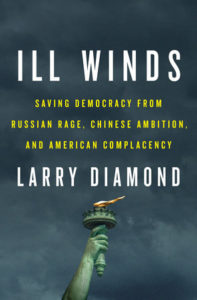 Instead of advancing democracy we should aim for good enough governance, argues #FSI‘s Stephen D Krasner, a Senior Fellow at Stanford University’s Freeman Spogli Institute for International Studies and the author of How to Make Love to a Despot: An Alternative Foreign Policy for the Twenty-first Century (Liveright, 2020).
Instead of advancing democracy we should aim for good enough governance, argues #FSI‘s Stephen D Krasner, a Senior Fellow at Stanford University’s Freeman Spogli Institute for International Studies and the author of How to Make Love to a Despot: An Alternative Foreign Policy for the Twenty-first Century (Liveright, 2020).
Last year, the political scientist Larry Diamond,* reflecting on his decades of studying democratization, wrote that “even people who resented America for its wealth, its global power, its arrogance, and its use of military force nevertheless expressed a grudging admiration for the vitality of its democracy.” Those people hoped, he wrote, that “the United States would support their cause.” The trouble is that, regardless of such hopes, despotic leaders do not want to provide benefits to those they govern; they want to support with arms or money those who can keep them in power. They will not accept policies that aim to end their rule. What’s more, organizing against a despot is dangerous and unusual. Revolutions are rare. Despots usually stay in power, he writes for Foreign Affairs:
 American naiveté about the likelihood of creating wealthy democratic states has been based on a widely held view of development and democracy known as “modernization theory.” This theory holds that wealth and democracy can be attained relatively easily. All that is necessary are population growth and technological progress. Greater wealth begets greater democracy, which in turn begets greater wealth. If countries can find the first step of the escalator, they can ride it all the way to the top. Yet modernization theory has a conspicuous failure: it cannot explain why consolidated democracy has emerged only very recently, only in a small number of countries, and only in certain geographic areas.
American naiveté about the likelihood of creating wealthy democratic states has been based on a widely held view of development and democracy known as “modernization theory.” This theory holds that wealth and democracy can be attained relatively easily. All that is necessary are population growth and technological progress. Greater wealth begets greater democracy, which in turn begets greater wealth. If countries can find the first step of the escalator, they can ride it all the way to the top. Yet modernization theory has a conspicuous failure: it cannot explain why consolidated democracy has emerged only very recently, only in a small number of countries, and only in certain geographic areas.- U.S. leaders have also been influenced by a second perspective on development, one that emphasizes institutional capacity. They have usually assumed that rulers in poorly governed states want to do the right thing but fail because their governments do not have the capacity to govern well, not because the rulers want to stay in power. But theories that stress institutional capacity fall at the first hurdle: they cannot explain why leaders in most countries would want to act in the best interests of their populations rather than in their own best interests.
- U.S. leaders would be more successful if they adopted a third theory of development: rational choice institutionalism. This theory emphasizes the importance of elites and stresses that only under certain conditions will they be willing to tie their own hands and adopt policies that benefit the population as a whole.
*The founding co-editor of the Journal of Democracy and the co-chair of the Research Council of the National Endowment for Democracy’s International Forum for Democratic Studies.







